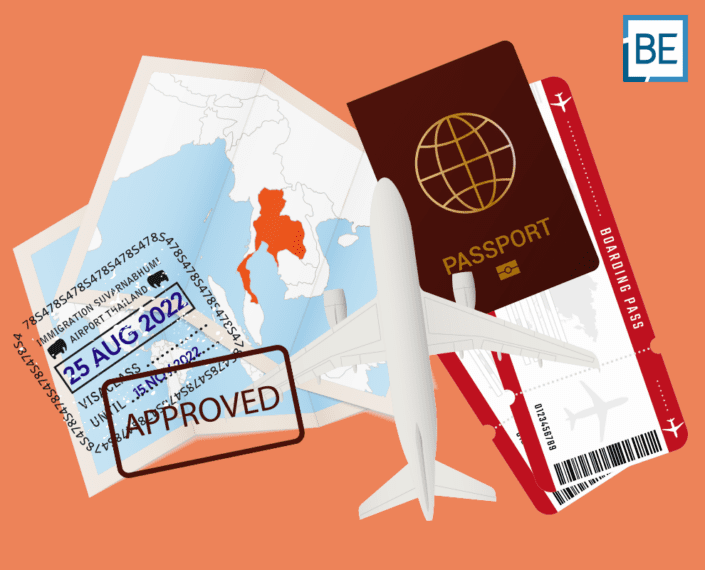Belaws Home ›› Thailand ›› Blog ›› Proposed Amendments to Ease Restrictions for Foreign Companies in Thailand in 2024
visa
Digital Nomad Visa Unveiled, Thailand Goes Remote in 2025
Disclaimer: Please note this article is based on our current understanding of the Destination Thailand Visa and may be subject to change and amendments. This article is for information purposes only and should not be considered professional advice.
In an effort to bolster its tourism industry and attract a new wave of international visitors, the Thai government has recently unveiled a new visa type – the Destination Thailand Visa (DTV). The DTV hopes to revolutionise the way digital nomads, remote workers, and long-term travellers are able to live and work in Thailand, by offering a digital nomad visa.
The introduction of the Destination Thailand Visa (DTV) is a welcome development that addresses a longstanding gap. For years, many remote workers and digital nomads have relied on extending tourist visas,education visas or Thai Elite Visa while working illegally in Thailand. This new visa provides a legal option for digital nomads to live and work long-term in the country.
Key points
- The Destination Thailand Visa (DTV) is a new visa designed for digital nomads, remote workers, and long-term visitors looking to stay in Thailand for an extended period.
- It allows the holder to stay in Thailand for up to 180 days per entry, the visa is valid for 5 years. There is an option to extend the visa for another 180 days once per entry.
- Eligibility requirements include being at least 20 years old and having at least 500,000 THB (approx. $13,650) in a bank account.
- The DTV costs 10,000 THB and offers a streamlined application process compared to other long-stay visa options.
- Key advantages over other visa options include flexible entry/exit, no work permit required for foreign employment, and a relatively low cost compared to programs like Thailand Elite.
- The Destination Thailand Visa (DTV) does not allow you to work for a company in Thailand
What is the Destination Thailand Visa?
In order to take advantage of the evolving needs and preferences of modern travellers, the Thai government has introduced the Destination Thailand Visa (DTV). This visa is designed to attract digital nomads, remote workers, and long-term visitors looking to stay in Thailand long term.
The DTV is also available to other groups as well, including those who want to learn muay Thai and Thai cooking.
The DTV allows the holder to stay in Thailand and work remotely in Thailand. The holders of this visa must work for companies or clients that are located in other countries and they cannot be Thai.
It is important to note that holders of this visa cannot work for a Thai company. Employment with a Thai company would require the individual to obtain the correct visa (Non-Immigrant B visa) and a work permit.
What are the Key Features of the Destination Thailand Visa?
The Destination Thailand Visa offers a range of attractive features that set it apart from traditional tourist visas:
Extended Duration of Stay and 5 Year Validity
The DTV allows holders to stay in Thailand for up to 180 days per entry. The DTV is valid for a five-year period.
Furthermore, holders of the DTV can extend their stay for 180 days one time per entry. This extension will cost 1,900 THB. The holder must leave Thailand on or before the date of expiry of the extension.
Flexible Entry and Exit
The DTV offers a flexible entry and exit policy, enabling holders to come and go from Thailand as per their travel and business plans.
Destination Thailand Visa Application Process
The application process for the Destination Thailand Visa has been streamlined, making it easier and more convenient for eligible applicants to obtain the necessary documentation. Full details about the application procedure and what is required is expected to be announced soon, we will provide an update as soon as we know more.
Eligibility for Spouse/Dependents
DTV holders will also be able to bring their spouses and children to Thailand as dependents. Please note, at the moment there is no information as to whether dependents are subject to extra application requirements. We will keep you updated as to any developments.
What are the Eligibility Requirements for the Destination Thailand Visa?
In order to qualify for the Destination Thailand visa, applicants must:
- be at least 20 years old and
- be able to provide evidence that they have at least $13,650 (500,000 THB) in a bank account to be used to support themselves throughout their stay in Thailand.
- be able to provide proof of employment or study
What are the Required Documents for Applying for a DTV?
The required documents to apply for the DTV visa as a digital nomad are as follows:
- Passport
- Passport Photograph
- Evidence of Financial Assets
- Amount of no less than 500,000 THB (the requested amount differs between each Thai embassy)
- Bank statements, payslips, or a sponsorship letter can act as evidence to support an application. Currently, it is unclear whether applicants must have the required funds in their account for a specified minimum amount of time prior to application. For example, this is the case with the Retirement and Marriage Visas, which requires the funds to be in the account a minimum of 3 months before application.
- Proof of Purpose of Visit:
- Workcation: Employment contract, employment certificate from your country, or a professional portfolio showing your freelance work.
- Thai Soft Power: Proof of confirmation to attend the activity e.g. learning Muay Thai or a letter of appointment from a hospital or medical centre. Please note that copies of any agency/school/institution/company documents must be signed by an authorized person and stamped with the agency/school/institution/company seal.
- Dependent of Primary DTV Holder: Proof of relationship, such as a marriage certificate, birth certificate, or certificate of adoption
Applicants must be aware that any documents in any language other than English or Thai must be translated into English and get the authorization from the company or organisation that provided them.
One final consideration is that the Consular officer handling the application reserves the right to require additional documents, or an interview with the applicant, as deemed necessary, without prior notice.
How Much Will the Destination Thailand Visa Cost?
The fee for the Destination Thailand Visa is 10,000 THB. The extension for a further 180 days will also cost 10,000 THB.
What are the Restrictions of the DTV?
The Destination Thailand Visa (DTV) offers several advantages for digital nomads, but it also comes with specific restrictions. Here are the main limitations associated with the DTV:
No Employment or Doing Business in Thailand
DTV holders are prohibited from working for Thai employers or companies in Thailand. DTV holders also cannot offer their services or have customers in Thailand. The visa is intended for those who work remotely for foreign companies or clients. If you wish to work for a Thai company or do business in Thailand, you would need to obtain a business visa and work permit or engage a PEO service. Doing any of the restricted activities above could result in serious repercussions such as being asked to leave Thailand and being banned from re-entry.
Length of Stay Limit
The DTV allows holders to stay in Thailand for up to 180 days per entry. After reaching this limit, you must leave the country and re-enter to continue your stay. While you can apply for a single extension of another 180 days per entry, this must be done at a Thai immigration office, and involves additional fees.
Proof of Funds:
Applicants must demonstrate financial stability by showing a minimum balance of 500,000 Thai Baht (approximately $13,900) in a bank account to support themselves during their stay
How does the Destination Thailand Visa Compare to the Existing Visa Options in Thailand?
Thailand already offers a couple of solutions for digital nomads and professionals who wish to work in Thailand, such as PEO services, LTR for Work from Thailand Professionals and the Thailand Elite. However, these can be very expensive and also have very strict entry requirements. Please see below for a comparison on the different visas available.
| DTV | Thailand Elite | Work From Thailand LTR Visa | PEO | |
| Official fees | 10,000 THB | One-time membership fee starting from 900,000THB (around $25,000) | 50,000 THB | 8,700 THB
Services fee varies depending on service provider |
| Length of stay | 5 years but each stay is limited to 180 days per entry.
Please note, an entry can be extended by a further 180 days ONE time. |
5 to 20 years depending on package chosen | 10 years. | For as long as the service contract is valid. Visa and Work Permit can be extended yearly for PEO clients. |
| Requirements | Minimum deposit requirement (500,000 THB), and be at least 20 years old. | Less stringent requirements, focus on membership fee payment | Strict application requirements including minimum salary requirements, education level, work experience and status of the company employing the applicant. | No minimum deposits.
Applicants must satisfy the service providers requirements e.g. job title, education, area of expertise. |
| Benefits | Possibility to legally work from Thailand for a company out of Thailand
Can work from Thailand without needing a work permit. Possibility to bring dependents (Spouse and children) – exact conditions to be confirmed. |
Multiple entries, VIP immigration services, exclusive discounts, personal assistant, potential for long stay without 90-day reporting
Reduced membership fees for spouse |
Holders of the LTR visa are eligible for tax exemption on overseas income
Possibility to obtain a work permit Possibility to bring dependents (Spouse and children). |
A year long visa and Work Permit which are both extendable each year.
The ability to do business in Thailand e.g. have Thai customers and offer services in Thailand. Possibility to bring dependents (Spouse and children). |
| Restrictions | Each stay is limited to 180 days per entry. Only one extension per entry is available. So you will need to leave and re-enter Thailand.
Scope of work strictly limited to working for companies and clients located outside of Thailand. Holders of the DTV may not work for or with Thai companies or even have customers in Thailand. There is a significant legal risk for holders of a DTV who do business in Thailand without the correct visa or a work permit, which could result in the holder being deported and banned from Thailand. For digital nomads who wish to do business in Thailand, a PEO service would be suitable. |
Holders of an Elite visa cannot work. | Very high entry costs and requirements. | Not everybody will be eligible for a PEO service. |
Can I Work for a Thai Company in Thailand with a DTV?
No, this is not possible. There is a strict requirement for the holders of a DTV visa to only work for companies and clients who are located outside of Thailand.
If a holder of a DTV wishes to work for a Thai company, they would need to change their visa to a Non-Immigrant B and apply for a work permit.
Should I choose the DTV or a PEO service?
When considering whether to choose the Destination Thailand Visa (DTV) or a Professional Employment Organization (PEO) service as a digital nomad looking to move to Thailand, it’s important to evaluate the benefits and limitations of each option based on your goals and circumstances.
Destination Thailand Visa (DTV)
The DTV is designed specifically for digital nomads, remote workers, and freelancers. Here are the key features:
Duration and Flexibility: The DTV allows stays of up to 180 days per entry, with a total validity of five years. You can extend your stay for another 180 days once per entry, making it suitable for those looking for flexibility in their travel plans.
Work Restrictions: Holders of the DTV can work remotely for clients or companies outside Thailand but cannot be employed by a Thai company or do any business in Thailand e.g. have Thai clients or provide services in Thailand. Therefore, anyone who wishes to do business in Thailand, cannot do so using the DTV. Should holders of the DTV undertake any business in Thailand without the correct visa and a work permit, they will be breaking the law and potentially kicked out of the country and banned from re-entering.
Financial Requirements: To qualify for the DTV, you need to demonstrate a minimum balance of 500,000 Thai Baht (approximately $13,650) in a bank account and pay a visa fee of 10,000 Thai Baht (around $280).
Professional Employment Organization (PEO) Service
A PEO service offers a more structured employment arrangement. Here are the main points to consider:
Duration and Flexibility: Digital Nomads who engage a PEO service will have a valid business visa and work permit which will let you reside in Thailand for at least one year, with options for yearly extensions. This can provide a more stable and long-term living arrangement compared to the DTV.
Employment Status and Ability to Work in Thailand: Having a valid business visa and work permit will allow you to work in Thailand, provide services in Thailand and have Thai customers. This is a significant advantage for a digital nomad who is looking to do business in Thailand and mitigates any risk associated with doing such activities under a DTV.
Cost Considerations: While the DTV has lower initial costs, a PEO may involve higher fees due to its comprehensive services, including handling employment and compliance matters.
Choosing between the DTV and a PEO service depends on your personal and professional needs. If you prioritise flexibility and short-term stays while working remotely for foreign clients, the DTV may be the better option. However, if you seek a more stable, long-term arrangement that allows you to do business in Thailand, a PEO service could be more suitable.
For more information about whether a DTV or our PEO services is the right choice for you, why not talk to one of our experts now and find out more.
Can I be My Own Employer (Self-Employed) and Apply for the DTV?
If you don’t have an employer, there are 2 options for digital nomads looking to relocate to Thailand. The first option is to apply as a freelancer and provide a portfolio of your work during the application process. The second option would be setting up a company, particularly an offshore company for example in Hong Kong. This approach allows you to essentially hire yourself in Thailand, which can offer significant advantages.
One key benefit is the potential for tax optimization. Under Thailand’s territorial tax system, only income remitted to Thailand e.g. a holder of a DTV remitting money to cover living expenses is taxable. Income earned outside Thailand remains untaxed in Thailand, provided it stays abroad.
By structuring your business correctly, you may be able to take advantage of various tax incentives and deductions. For instance, Hong Kong offers companies who have obtained offshore status special tax exemptions for certain types of business activities, which could result in substantial savings.
Hong Kong allows offshore companies to claim tax exemption on profits derived from outside Hong Kong as a company with offshore status.
Offshore status in Hong Kong refers to the classification of companies that conduct their business operations entirely outside of Hong Kong and derive their profits from foreign sources. This status allows such companies to benefit from a tax exemption, meaning they are not subject to Hong Kong’s profits tax on income earned outside the territory. This could be a significant benefit for holders of a DTV who are looking for tax optimisation options as well.The tax structure should be reviewed by a tax expert, as tax regulations are subject to change and can be interpreted differently depending on the substance and risk of permanent establishment for companies lacking substance.
Additionally, an offshore company can provide flexibility in terms of how you manage your income and expenses. It may allow you to separate your personal and business finances more effectively, potentially leading to better overall financial management.
If you’d like to explore these options further or have any questions about setting up a company in Thailand or Hong Kong, we’d be happy to provide more detailed information. Please don’t hesitate to contact us for a detailed consultation.
Can I stay in Thailand for 5 Years Continuously?
From our current understanding, the DTV will only allow holders to remain in Thailand for 180 days per entry. This 180 days can be extended one time for a further 180 days per entry. After the initial 180 days and 180 day extension has been used, the holder must leave Thailand. When they re-enter they will receive a new 180 day entry.
What are my Tax Obligations Under the DTV?
Thailand’s tax obligations depend on whether you’re considered a tax resident or non-resident. Residency is determined by staying in Thailand for 180 days or more in a calendar year. This is an important consideration as DTV holders who stay in Thailand for the entire time permitted or extend their stay, will be considered tax residents and subject to several obligations.
Tax Residents:
- Residents are taxed on income earned in Thailand and income earned abroad and is remitted into Thailand.
- Tax rates are progressive, ranging from 0% to 35% on net taxable income after deductions.
- Residents typically file annual tax returns by March 31st of the following year.
Non-Tax Residents:
- Non-residents are only taxed on income derived from sources within Thailand.
- This includes income from employment, business activities, rentals, and certain other categories.
How can Belaws help?
For more information about the new digital nomad visa in Thailand, why not talk to one of our experts now?
Please note that this article is for information purposes only and does not constitute legal advice.
Our consultations last for a period of up to 1 hour and are conducted by expert Lawyers who are fluent in English, French and Thai.
Consultations can be hosted via WhatsApp or Video Conferencing software for your convenience. A consultation with one of our legal experts is undoubtedly the best way to get all the information you need and answer any questions you may have about your new business or project.
USD 150
Up to 1 hour
Online payment (Paypal or Credit card)
Legal consultation can be conducted in English, French or Thai
Legal consultations are handled by experienced lawyers from the relevant fields of practice
Frequently asked questions
What is the Destination Thailand Visa (DTV)?
The DTV is a new visa designed for digital nomads, remote workers, and long-term visitors who want to live and work remotely in Thailand for up to five years.
Is the Destination Thailand Visa (DTV) the same as a digital nomad visa?
Yes, the Destination Thailand Visa (DTV) can be considered a type of digital nomad visa. It’s specifically designed for remote workers and freelancers who want to live and work remotely in Thailand for extended periods. While the term “digital nomad visa” isn’t officially used, the DTV offers the features and flexibility that digital nomads typically look for, such as the ability to work remotely, a long validity period, and the option for multiple entries.
How long can I stay in Thailand with a DTV visa?
You can stay in Thailand for up to 180 days per entry with the DTV visa. You can extend your stay for an additional 180 days once per entry.
How much does the DTV visa cost?
The DTV visa costs 10,000 THB (around $280 USD). There is an additional fee of 10,000 THB to extend your stay for 180 days.
Can I work for a Thai company with a DTV visa?
No, you cannot work for a Thai company with a DTV visa. The visa is strictly for working for companies and clients outside of Thailand.
Can I bring my dependents with a DTV visa?
Yes, the DTV visa allows you to bring your spouse and children as dependents. However, the exact application requirements for dependents are still to be confirmed.
Is the DTV visa the same as a Thailand Elite visa?
No, while both allow extended stays, the DTV is more affordable and caters specifically to remote workers. The Elite visa offers additional perks like VIP services but has higher costs and stricter requirements.
Is DTV visa a Long-term visas in Thailand?
Yes, the DTV visa can be considered a long-term visa in Thailand, with some key limitations. Here’s a breakdown:
- Long-term aspect: The visa itself is valid for five years (long-term compared to standard tourist visas).
- Stay limitations: You can only stay in Thailand for a maximum of 180 days per entry, with a single 180-day extension allowed per year. This means you’ll need to leave and re-enter Thailand to maintain legal status.
So, while the DTV allows for extended stays in Thailand compared to most visas, it’s not continuous residence. It’s best suited for digital nomads who want to spend significant time in Thailand but with breaks in between.
If you wish to stay longer in Thailand you might want to consider other options, such as Thailand Elite or LTR Visa
Related articles
Subscribe today
Subscribe today
To our newsletter for all the latest legal news
in South East Asia, Belaws updates and
special promotions on our services.
To our newsletter today for all the latest legal news in South East Asia,
Belaws updates and special promotions on our services.







